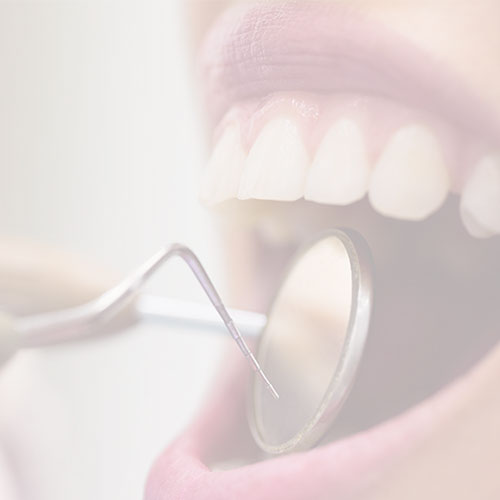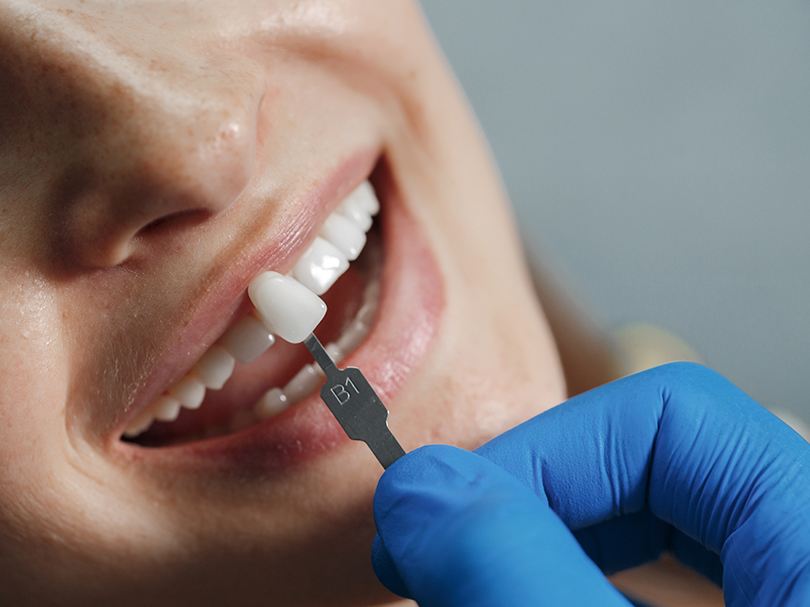What is Dental Bonding?
Dental bonding is a cosmetic procedure that uses a tooth-colored composite resin material to enhance your smile. This procedure is used to repair chips, close down gaps or change the shape and color of a tooth. Unlike other cosmetic dental treatments, such as porcelain veneers, dental bonding is completely reversible.
Healthcare providers prefer to save natural teeth whenever possible. But sometimes, other restorative methods — such as dental fillings or dental crowns — aren’t enough. If your tooth has been badly damaged past the point of repair, then removal may be necessary.
Comprehensive Composite Bonding
![]() Repairing Damaged Smiles
Repairing Damaged Smiles
![]() From Dull to Dazzling
From Dull to Dazzling
![]() Reshaping the teeth
Reshaping the teeth
![]() Shielding Roots from Receding Gums with Composite Bonding
Shielding Roots from Receding Gums with Composite Bonding
Advantages of Dental Bonding

Minimally Invasive
Gentle Dental Enhancement: Minimal Tooth Alteration with Dental Bonding.

Cost-effective
Dental bonding is one of the least expensive cosmetic dental procedures available.

Versatile
Versatile Dental Bonding: Hiding Chips, Cracks, Gaps, and Discoloration with Ease.

Fast and convenient
Enhancing Your Smile at Orthosquare Dental Clinic with a Single Visit Dental Bonding.
Discover our Cosmetic Dental Bonding Treatment to enhance your smile

Dental Bonding Procedure
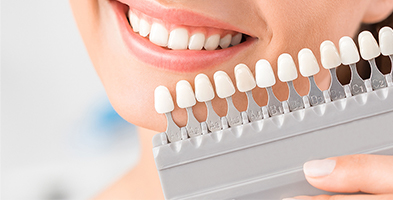
.png) Select a Shade
Select a Shade
Your dentist uses a shade guide to select a composite resin material that matches the color of your natural teeth.
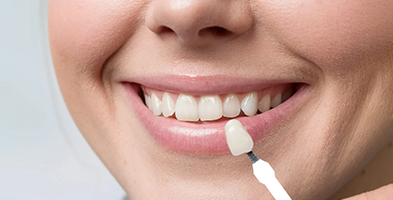
 Prepare your Tooth
Prepare your Tooth
The surface of your tooth is roughened and a conditioning liquid is applied. These steps help the bonding material stick to your tooth.
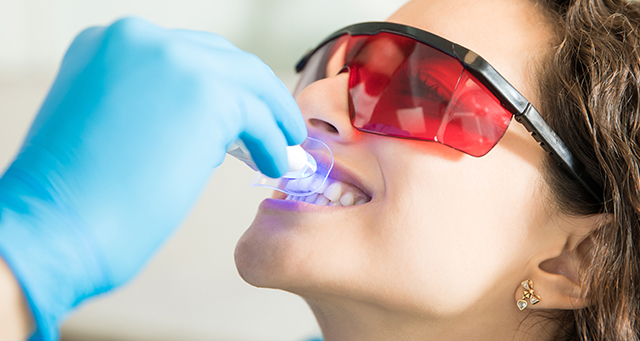
 Apply the Composite Resin
Apply the Composite Resin
The resin material (which is a putty-like consistency) is applied, molded and smoothed to the desired shape.
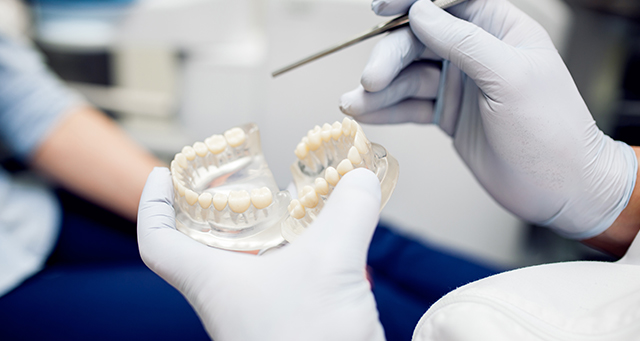
 Cure the Material
Cure the Material
Next, the composite resin is hardened with a special curing light, which "bonds" the material to the surface of your tooth.

 Polish your Tooth
Polish your Tooth
Finally, your dentist will make any necessary final adjustments and polish your tooth to a natural-looking shine
Before & After Gallery
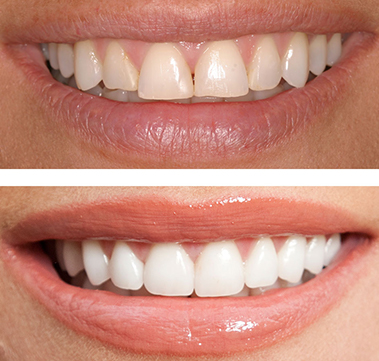
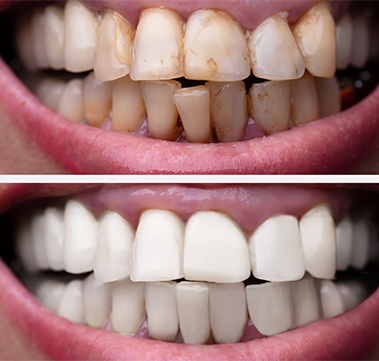
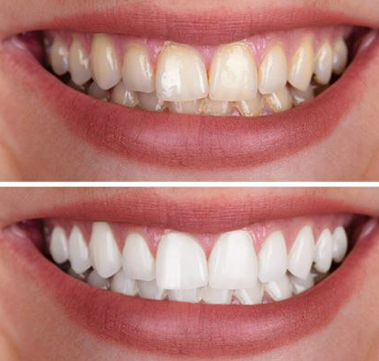
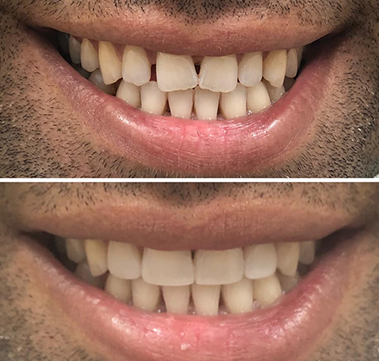
Curious about the cost of Teeth Bonding Treatment?
Our patient's Experiences
Frequently Ask Questions
Dental bonding is a cosmetic dentistry procedure that involves the application of a tooth-coloured resin material to improve the appearance of teeth. This technique is commonly used to address various aesthetic concerns such as chipped, cracked, or discoloured teeth, as well as to close small gaps between teeth. During the dental bonding process, the dentist prepares the tooth surface by roughening it and applying a conditioning liquid to enhance the bond between the tooth and the resin material. The dentist then moulds and shapes the resin onto the tooth, using a special light to harden and bond the material to the tooth's structure. Once the bonding is complete, the dentist further refines and polishes the resin to achieve a natural and seamless look that blends with the surrounding teeth. Dental bonding is a versatile and minimally invasive solution that can enhance the appearance of teeth without the need for more extensive procedures like braces or tooth extraction. One of the advantages of dental bonding is its relatively quick and straightforward nature. The entire process can often be completed in a single dental visit, making it a convenient option for individuals seeking immediate cosmetic improvements. Dental bonding is an effective solution for minor cosmetic issues, but its durability may not match that of more robust restorative options like dental crowns or bridges. Patients considering dental bonding may consult with their dentist to determine if it aligns with their aesthetic goals and overall oral health needs. This cosmetic procedure can be part of a broader treatment plan that may include other interventions such as teeth whitening, scaling and root planing, or the placement of complete dentures, depending on the individual's unique dental requirements.
The longevity of dental bonding can vary based on several factors. On average, dental bonding lasts between 5 to 10 years, but this duration is influenced by individual habits, oral hygiene practices, and the extent of wear and tear. While dental bonding is durable and can withstand everyday chewing and biting forces, it may be more prone to chipping or staining compared to materials like porcelain used in dental crowns or bridges. Patients are advised to avoid habits that can compromise the bonding, such as biting on hard objects or using teeth as tools. Regular dental check-ups are essential to monitor the condition of the bonding and address any issues promptly, contributing to its extended lifespan. If the bonding becomes discoloured or damaged over time, individuals may consider touch-ups or replacements to maintain the aesthetic appeal of their smile. Dentists can provide guidance on oral care practices to prolong the life of dental bonding, which may include using a soft-bristled toothbrush, avoiding abrasive toothpaste, and practising good oral hygiene. For individuals seeking a longer-lasting solution or addressing more extensive dental issues, alternatives such as dental crowns or bridges may be considered. These restorative options provide enhanced durability and strength, making them suitable for cases where a higher level of resilience is required. The decision on the choice of dental treatments, whether it be braces, teeth whitening, root canal therapy, or the placement of crowns and bridges, often involves a collaborative effort between patients and their dentists to tailor a comprehensive treatment plan that aligns with individual dental health needs and long-term goals.
Composite bonding is generally considered a reversible cosmetic dental procedure. Unlike more invasive treatments like tooth extraction or certain aspects of root canal therapy, dental bonding involves the application of a tooth-coloured resin directly onto the tooth's surface. The process requires minimal removal of enamel, and the bonding material adheres to the existing tooth structure. This characteristic makes composite bonding reversible in the sense that, if desired, the bonded material can be removed, and the natural tooth structure remains largely intact. However, it's essential to note that while the procedure itself is reversible, the process of removing the bonding material may require additional dental intervention and careful consideration of the tooth's aesthetic and functional aspects. The decision to reverse composite bonding may arise in situations where the patient wants to explore alternative cosmetic treatments or if the bonding material requires replacement due to wear, staining, or damage over time. Dentists can provide guidance on the potential reversibility of dental bonding and discuss alternative cosmetic dentistry options, including teeth whitening, dental crowns, or other restorative treatments like scaling and root planing or the placement of complete dentures. Understanding the reversible nature of composite bonding allows individuals to make informed choices about their cosmetic dental procedures, aligning with their preferences and long-term oral health goals.
Composite bonding is a suitable option for individuals seeking cosmetic improvements to their teeth. It is commonly recommended for addressing minor aesthetic concerns such as chipped or discoloured teeth, closing small gaps, or reshaping irregularly shaped teeth. This cosmetic procedure is versatile and can be an excellent choice for those looking to enhance their smile without more extensive treatments. Composite bonding is often preferred for its conservative nature, requiring minimal removal of enamel compared to procedures like dental crowns or bridges. It is an effective solution for individuals who want a relatively quick and non-invasive way to achieve a more aesthetically pleasing smile. It can be especially beneficial for those considering comprehensive dental care plans that may include other treatments like braces, teeth whitening, or scaling and root planing. Timing for composite bonding may also be influenced by individual preferences and priorities. Some individuals choose to undergo composite bonding as a standalone cosmetic procedure, while others may incorporate it into a broader treatment plan that addresses multiple dental needs. Patients should consult with their dentist to discuss their specific cosmetic goals, and dentists can provide guidance on whether composite bonding aligns with their expectations. Whether seeking to improve the appearance of a single tooth or considering comprehensive cosmetic dentistry, the timing of composite bonding can be customised to fit into an individual's overall oral health and aesthetic aspirations.
Dental bonding is a versatile cosmetic dentistry procedure that can effectively address various aesthetic issues. It is commonly used to repair chipped or cracked teeth, providing a conservative and aesthetically pleasing solution. Bonding can also be employed to close small gaps between teeth, offering a non-invasive alternative to orthodontic treatments like braces. For individuals with discoloured teeth that do not respond well to teeth whitening procedures, dental bonding can be utilised to improve the colour and overall appearance of the teeth. Additionally, dental bonding is an effective method for reshaping irregularly shaped teeth, creating a more harmonious and balanced smile. The procedure is known for its versatility in addressing minor cosmetic imperfections, making it a popular choice for individuals seeking enhancements without the need for more extensive treatments like tooth extraction or the placement of crowns and bridges. Whether as a standalone cosmetic procedure or as part of a comprehensive treatment plan, dental bonding provides a conservative and customizable approach to address various cosmetic issues. Its applicability extends to cases where individuals desire a quick and minimally invasive solution to improve the overall aesthetics of their smile. Consulting with the best dental clinic in Bangalore allows individuals to explore the potential of dental bonding and determine its suitability for their unique cosmetic goals. The best dental clinic in Bangalore can provide personalised recommendations and guide patients on the most effective cosmetic dentistry options, ensuring that the chosen procedures align with the individual's preferences and contribute to achieving their desired smile transformation.
The duration of the dental bonding procedure can vary depending on the extent of the cosmetic work being performed. In general, dental bonding is a relatively quick and efficient process that can often be completed in a single dental appointment. The procedure typically takes between 30 minutes to an hour per tooth, making it a convenient option for individuals seeking immediate cosmetic improvements. Unlike more extensive treatments like root canal therapy or the placement of crowns and bridges, dental bonding involves minimal preparation and can often be accomplished without the need for anaesthesia. The efficiency of the procedure contributes to its popularity, allowing individuals to achieve noticeable enhancements to their smile in a short amount of time. Choosing the best dental clinic in Hyderabad is crucial for a seamless dental bonding experience. Experienced and skilled dentists in the best dental clinic in Hyderabad can efficiently assess the cosmetic issues, tailor the bonding procedure to the patient's unique needs, and provide personalised recommendations. Additionally, the best dental clinic in Hyderabad may utilise advanced techniques and materials to ensure the durability and aesthetic success of the bonding. Patients can consult with professionals at the best dental clinic in Hyderabad to discuss their cosmetic goals, explore the potential of dental bonding, and determine the most suitable approach for achieving the desired improvements to their smile.
Directors & Cluster heads
Our administration and support staff all have exceptional people skills and Trained to assist you with all medical enquiries.

Dr. Kunal Shet
BDS, MDS, Orthodontics & Dentofacial Orthopedics, Implantologist (Masters in Cortical Implantology)
Dr. Kunal Shet is a distinguished dentist with an impressive academic background, including a postgraduate degree in Orthodontics and Dentofacial Orthopedics.

Dr. Riddhi Rathi Shet
BDS, MDS in Orthodontics & Dentofacial Orthopedics, Masters in Cortical and Immediate loading Implantologist (Italy), Masters in Advance Implantology (Smile USA)
Dr. Riddhi Rathi Shet is a highly qualified dental professional with an impressive academic background, including BDS and MDS degrees.

Dr. Sayali Jadhav
BDS, Fellowship in esthetic dentistry and Occlusion Certified Implantologist
Dr. Sayali Jadhav is a highly regarded Certified Implantologist and Esthetic Dentist. Her dental journey commenced in 2014 when she completed her BDS from Dr. DY Patil University.

Dr. Isha Jain
BDS
Dr. Isha Jain, a highly distinguished dentist who proudly graduated from Dr. D. Y. Patil Vidyapeeth, Pune in 2017.

Dr.Akhil Nair
BDS Implantologist
Dr. Akhil Nair is a highly accomplished Certified Implantologist, known for his remarkable contributions to the field of dentistry.

Dr. Akash Balaji Iyer
BDS, MDS Periodontology and Oral Implantology
Dr. Akash Balaji Iyer, an accomplished dentist specializing in Periodontics & Oral Implantology, is a vital part of Orthosquare's expert team.

Dr. Apurva Vaidya
BDS, MDS (Oral and maxillofacial surgery) Implantologist
Dr. Apurva Vivek Vaidya, BDS, MDS in Oral and Maxillofacial Surgery, stands as a distinguished dental professional with specialized expertise in oral and maxillofacial surgery.

Dr. Ruchi Bhansali
Dr. Ruchi Bhansali is a Dentist, Aesthetic smile design, Implantologist, and Periodontology.
Dr. Ruchi Bhansali is a highly qualified and compassionate dentist dedicated to delivering personalized dental care.

Dr. Divya Navsariwala Iyer
BDS. Specialist in Cosmetic Dentistry & Smile Designing.
Dr. Divya Navsariwala Iyer, a distinguished dentist and Smile Designing Specialist, holds the position of Regional Head for Pune at Orthosquare. With a BDS degree from Pravara Institute of Medical Sciences and a remarkable decade of clinical experience, she is recognized for her expertise in smile designing, aesthetics, and dental veneers.

Dr. Dhwani Doshi
BDS
Dr. Dhwani Doshi, BDS, is a distinguished dentist with a specialization in cosmetic dentistry, smile designing, and root canals, holding a certification as an FMR specialist. Graduating from MGM Dental College, Navi Mumbai, in 2013-17, she brings a strong academic foundation to her practice.

Dr. Nehal Gandhi
BDS
Dr. Nehal Gandhi, a distinguished Dental surgeon and Director at Orthosquare Multi-speciality Dental Clinic, stands as a prominent figure in the field of dentistry.

Dr. Shraddha Kambale
BDS
Dr. Shraddha Kambale holds the esteemed position of Regional Dental Director and is a highly proficient general dentist with over 16 years of practice.

Nilay Vakharia
BDS, MDS (Oral & Maxillofacial Surgery)Implantologist.
Dr. Nilay Vakharia, an OMFS (Oral & Maxillofacial Surgery) specialist, completed his post-graduation in OMFS from Pacific Dental College in 2017.
.webp)
Dr. Shail Kothari
BDS, Specializing in Implantology.
Dr. Shail Kothari is a highly skilled dental professional, specializing in Implantology and Endodontics. He completed his graduation from Dr. D. Y. Patil University in Mumbai and pursued his master's degree in Dentistry from esteemed institutions in Bangalore and the USA.

